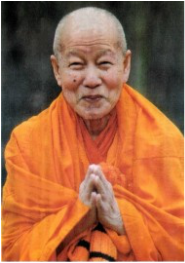 The Most Venerable Maha Ghosananda
The Most Venerable Maha Ghosananda
The following are comments on attaining peace from a talk given by the Most Venerable Maha Ghosananda, a frequent nominee for the Nobel Peace Prize, in 1995.
"We simply tell people the truth. When you are hungry you need food, when you are thirsty you need water. We do not blame anybody but ourselves. If we blame other people they become upset. But we have to tell people the truth. We have to explain why we suffer: We suffer because of craving, aversion and illusion. If we want happiness, we must practice generosity, morality and meditation and transcend the world.
Ordinary people can be creators of peace: There is little we can do for peace in the world without peace in our minds. And so when we begin to make peace, we begin with silence, meditation and prayer. When we stabilize our posture and calm our mind, we can realize peace within ourselves. Then we can radiate loving kindness to those around us, our family, our community, our nation and the whole world.
Peacemaking requires compassion. It requires the skill of listening. To listen we have to give up ourselves, even our own words. As we come to trust one another we discover new possibilities for overcoming conflict. If we listen carefully we can hear peace growing.
Peacemaking requires selflessness. There is little we can do for peace as long as we think we are the only ones who know the way. Peacemaking requires wisdom. Peace is a path that is chosen consciously. It is not an aimless wandering, but a step-by-step journey.
We are advised to be mindful and to believe in the law of karma. Good deeds will bring happiness and bad deeds will bring suffering. If you kill, then ultimately you yourself get killed, you have a short life, whereas if you don’t kill, your life will be long.
We Buddhists must find the courage to leave our temples and enter the temples that are filled with human suffering. If we listen to the Buddha, Christ or Gandhi we can do nothing else. The refugee camps, the prisons, the ghettos and the battlefields will then become our temples.
We must remove the landmines in our hearts which prevent us from making peace: Greed, hatred, and delusion. We can oppose greed with the weapons of generosity. We can oppose hatred with the weapons of loving kindness. We can oppose delusion with the weapon of wisdom and understanding. Peacemaking begins with us. As we make peace for ourselves and our country we make peace for the whole world.
We always want a lot, but everything starts from the little thing. We were born as a tiny being and now we are adults. We want to reach the horizon in a few steps and don’t realize that the important thing is here and now. All will come to the same thing in the end. Breathing in, breathing out, word by word, we have a lot of words now. Everything progresses by the same principles, step by step."
"We simply tell people the truth. When you are hungry you need food, when you are thirsty you need water. We do not blame anybody but ourselves. If we blame other people they become upset. But we have to tell people the truth. We have to explain why we suffer: We suffer because of craving, aversion and illusion. If we want happiness, we must practice generosity, morality and meditation and transcend the world.
Ordinary people can be creators of peace: There is little we can do for peace in the world without peace in our minds. And so when we begin to make peace, we begin with silence, meditation and prayer. When we stabilize our posture and calm our mind, we can realize peace within ourselves. Then we can radiate loving kindness to those around us, our family, our community, our nation and the whole world.
Peacemaking requires compassion. It requires the skill of listening. To listen we have to give up ourselves, even our own words. As we come to trust one another we discover new possibilities for overcoming conflict. If we listen carefully we can hear peace growing.
Peacemaking requires selflessness. There is little we can do for peace as long as we think we are the only ones who know the way. Peacemaking requires wisdom. Peace is a path that is chosen consciously. It is not an aimless wandering, but a step-by-step journey.
We are advised to be mindful and to believe in the law of karma. Good deeds will bring happiness and bad deeds will bring suffering. If you kill, then ultimately you yourself get killed, you have a short life, whereas if you don’t kill, your life will be long.
We Buddhists must find the courage to leave our temples and enter the temples that are filled with human suffering. If we listen to the Buddha, Christ or Gandhi we can do nothing else. The refugee camps, the prisons, the ghettos and the battlefields will then become our temples.
We must remove the landmines in our hearts which prevent us from making peace: Greed, hatred, and delusion. We can oppose greed with the weapons of generosity. We can oppose hatred with the weapons of loving kindness. We can oppose delusion with the weapon of wisdom and understanding. Peacemaking begins with us. As we make peace for ourselves and our country we make peace for the whole world.
We always want a lot, but everything starts from the little thing. We were born as a tiny being and now we are adults. We want to reach the horizon in a few steps and don’t realize that the important thing is here and now. All will come to the same thing in the end. Breathing in, breathing out, word by word, we have a lot of words now. Everything progresses by the same principles, step by step."